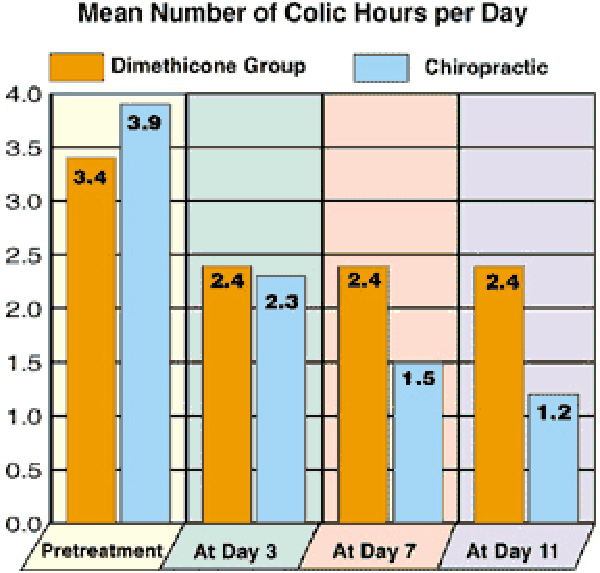The Effect of Chiropractic Treatment on Infantile Colic: Study Protocol for a Single-blind Randomized Controlled Trial
SOURCE: Chiropractic & Manual Therapies 2018 (Jun 7); 26: 17
Lise Vilstrup Holm, Dorte Ejg Jarbøl, Henrik Wulff Christensen, Jens Søndergaard, and Lise Hestbæk
Nordic Institute of Chiropractic and Clinical Biomechanics,
University of Southern Denmark,
Campusvej 55, DK-5230 Odense M, Denmark.
BACKGROUND: Infantile colic is a common condition during early childhood affecting around one of six newborns. The condition is characterized by inconsolable crying and fussing in otherwise healthy and thriving infants. The most used definition is excessive crying for at least three hours a day for at least three days for at least three weeks. The cause of colic is still unknown although many hypotheses and thereby many different treatment modalities have been investigated. Chiropractic care is used increasingly in treatment of infants, including for infantile colic, although the evidence worldwide is sparse. A randomized, controlled trial was designed to evaluate the effect of chiropractic treatment on infantile colic. This paper describes the protocol as well as results from a pilot study examining the acceptability and feasibility of the intervention.
METHOD: The study is designed as a single-blind randomized, controlled trial. The invited families are residents on the Island of Funen and information about the project is distributed from the maternity wards and health visitors. Children at the age of 2–14 weeks with unexplained excessive crying are screened for eligibility and recruited by the primary investigator through home visits. Eligible children are then randomized to chiropractic treatment or control. All children attend in the chiropractor clinic two times a week for two weeks. The parents are unaware of their child’s allocation during the project period. The primary outcome measure is change in daily hours of crying based on the parental diaries.The study intends to include 200 children, and the intervention has, during a pilot study, been found acceptable and feasible among families with newborns.
DISCUSSION: In a single-blind randomized controlled design we will evaluate the effectiveness of chiropractic treatment on infantile colic. The study will contribute to determine the effect of chiropractic treatment on infantile colic in an area where limited evidence exists. Furthermore, the study aims to explore if subgroups of children with suspected musculoskeletal problems will benefit more from the intervention than others. If they obtain better results, this could imply the need for stratified care.
There are more articles like this @ our:
TRIAL REGISTRATION: Clinicaltrials.gov and Identifier: NCT02595515 (registered 2 November 2015).
KEYWORDS: Child; Chiropractic treatment; Infant; Infantile colic; Manual therapy; Randomized controlled trial
From the Full-Text Article:
Background
Infantile colic is a common condition during early childhood affecting on average one of six newborns. The condition is characterized by inconsolable crying and fussing in otherwise healthy thriving infants. The most used definition is excessive crying for at least three hours a day for at least three days a week for at least three weeks. The babies are between two and four months, with a mean onset of colic at two weeks and an average duration of symptoms of four to five months. [1, 2]
Although the symptoms in most cases cease at the age of four to five months and very rarely indicate serious underlying disease, unexplained crying is a common cause for seeking professional medical advice. [3] This may reflect the burden and stress experienced by the families of a colicky child. [4, 5] Having a colicky child has been associated with higher risk of maternal postpartum depressive symptoms and a high level of distress even after the colic has stopped. [6–8] In the extreme, inconsolable crying can lead to child abuse, and has been associated with baby shaken syndrome. [9, 10] Furthermore, even though colic is considered a ‘benign and self-limiting’ condition, an increasing number of studies indicate there may be sequelae to this condition, including later developmental and behavioral problems, such as sleeping disorders, sensory processing abilities, lack of concentration, hyperactivity and temper tantrums. [6, 11–13]
Read the rest of this Full Text article now!



Leave A Comment